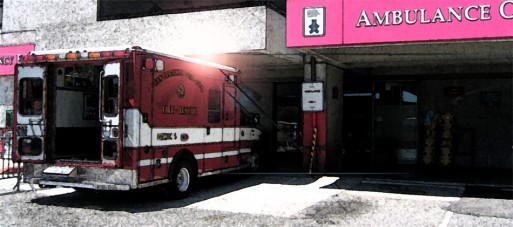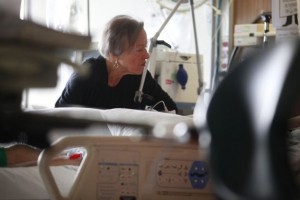Reverend Lana S. Sandahl is Hospital Chaplain at Kaiser Permanente, South San Francisco Medical Center. She works in the Spiritual Care Department, providing counseling, spiritual guidance, comfort and advice to those facing end-of-life, intense trauma or life-limiting illness. She sat down with SevenPonds and told us about her work.
Antal: Begin by telling us a bit about yourself. What is your role as chaplain at Kaiser? How did you get started in this line of work?
Lana: I started out practicing chiropractic and alternative healing and body work in San Francisco professionally for many years in San Francisco. I got started in the practice in 1981, which was right at the beginning of the AIDS epidemic in the Castro. Many of my clients and friends were dying of AIDS. People were dying in the street. Working so closely with them, that time really affected my life, spiritually and ethically, as I cared for people who were very sick with HIV. Interacting with them and their families and friends, death and loss became an everyday occurrence for me. Many were young, lonely and afraid. They were victimized and stigmatized, and this led me to explore spiritual practice and healing.
Antal: And this led you to look into being a chaplain?
Lana: That was some time later. I explored chaplaincy as one of my options and I decided I wanted to provide spiritual care through this avenue. I got my masters at the Pacific School of Religion in Berkeley, and then another year of training in the medical setting and did that at the San Francisco General Hospital and at Kaiser. I started as a chaplain in 2007, so have been going for about six years now.
Antal: Do you only serve dying or near-death patients?
Lana: No. In the hospital there are many people who have very acute needs. Often I see patients and their family members, those who are dealing with life-limiting illness. Some people with heart disease, respiratory illnesses, they’ll get brought into the hospital and their illnesses will worsen or they’ll feel under stress, and that’s when I will meet with them and help them with their concerns, and help them with their care decisions.
Antal: So you participate in medical decision-making?
Lana: Not medical decisions, but some of their care choices. I work with the palliative care team, that’s a physician and a nurse, sometimes a social worker, and me, the chaplain. We try to offer a multi-disciplinary approach to help families deal with end-of-life decisions.
Antal: I have this image of chaplains being Catholic or Christian. Is that accurate? What are the options for those of perhaps a less common spiritual belief or religious denomination?
Lana: One of the most common misconceptions about chaplains is that we’re associated with specific religions, but really all chaplains these days are trained to focus on an inter-faith and multi-faith perspective. Years ago many chaplains came from local churches, and they might have been single denominational, but now chaplains have come from professional care, and one of the main goals is to take spirituality out of that intensely secular context.
One of the pre-conceived notions is that you have to be religious to avail yourself of chaplain services. There’s a big difference between religion and spirituality, and chaplains are meant to respect that. Religion is only a set of specific practices to me, and spirituality reflects all the diverse ways we address larger issues in life, whenever people come up with these existential questions about life, living, death. Chaplaincy is more about helping people of all religious traditions, and ensuring that the medical process respect patient’s spiritual or religious traditions.
Antal: How can a family or individual make the most of your services? Can you aid in the recovery or healing processes?
Lana: When people are in the hospital or in hospice, chaplain services are always available, and I think it really behooves families to speak to a chaplain, because we play a very neutral role. We can help families address questions that are troubling them, to embrace the dying process and help put feelings and concerns into words. We also serve as a very strong advocate for patients with the medical staff.
Antal: Tell us more about that. How do you advocate for patients?
Lana: When people are in hospital there are so many things to worry about, someone called it once a “rush of caring.” It can get hard to hear these things clearly, and it’s easy to get very confused. And sometimes people may have values that may interfere with their treatment. So blood products can be an issue. Families might have a different idea of care values. Chaplains can help clarify the values of the families, consult closely with them and relay their concerns to the medical professionals. Chaplains can also help with advance directives and preparing end-of-life plans.
Antal: Well thank you so much for speaking with us. Do you have any closing words for our readers?
Lana: The beauty of chaplaincy is it is really just a privilege to assist others on the edge of life, and I think when people reach that final boundary it can really help to assist people in accepting their own mortality. It can be, of course, not just physical but emotional and spiritual to experience pain and suffering. Death and dying over the last few decades, people are now able to accept and talk about death, and that means we’re getting better at creating space and understanding.
Dying brings up existential issues, and no matter who you are or what you believe, you begin to question and start to look for deeper truth, and sometimes families will react, and chaplains can help families focus on relationship, to help make the experience a little less charged, and a little less fearful.
Antal: Again, thank you so much for speaking with us.
You can reach Rev. Sandahl at her South San Francisco Kaiser Permanente office at 650-742-3739.
- Read advice for supporting a person living with AIDS.
- Our review of the Robin Williams film, Patch Adams.

 What are the Responsibilities of a Chaplain? An Interview with Rev. Lana Sandahl
What are the Responsibilities of a Chaplain? An Interview with Rev. Lana Sandahl




 Forest Bathing Eases Grief by Soaking in Nature
Forest Bathing Eases Grief by Soaking in Nature
 The Spiritual Symbolism of Cardinals
The Spiritual Symbolism of Cardinals















